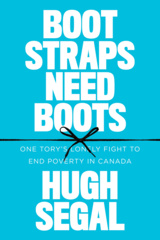
The results of the 1993 federal election were unprecedented: the governing party was reduced to two seats, a separatist party became the official opposition, and a new regional party swept the West. Pivot or Pirouette? covers both the backstory and the aftermath of the election, as told by an insider who was involved in the events before, during, and after the ballots were cast.
Brian Mulroney’s Progressive Conservatives had won two majority governments in the 1980s but his grand coalition of Québécois, Western, and traditional Tory voters fell apart under the stress of constitutional politics. Party leaders Lucien Bouchard and Preston Manning moved in to recruit discontented voters to their new regional parties, and Conservatives’ attempts to resurrect their failing fortunes by choosing Kim Campbell as the first female prime minister were too little, too late. Although the shocking results seemed pivotal, ultimately the pivot turned into a full pirouette as Canadian politics returned to historical norms.
This lively book demonstrates that 1993 was part of the longstanding pattern of Canadian politics – punctuated equilibrium – in which new parties shake up the system but are eventually absorbed into it, bringing innovation but not transformation. You can’t understand modern Canadian politics without understanding the 1993 federal election, in many ways the strangest in the country’s history.
This book will appeal to readers interested in Canadian politics and history, and will be vital reading for undergraduate students of political science, Canadian studies, and history.
[Flanagan] is singularly suited to discuss this seismic election.
As a research director for Reform in its foundational period and a key player in the Conservative Party under Stephen Harper, Flanagan is well placed to tell this story. The result is a well-written, first-rate election study.
Populism is to the politics of Western Canada what nationalism is to the politics of Quebec, and the world of populism is as distant from the academy as Earth is from Mars. But Professor Tom Flanagan is one of the few academic astronauts who has made the journey from Mars to Earth and back, and this account of his journey is well worth reading.
Canada’s general election of 1993 certainly felt momentous at the time. But Tom Flanagan hasn’t given us simply a trip down memory lane. This is a rollicking, back-to-the-future ride, showing us the forces – and the tensions – that endure in this country, even when we believe the status quo is being shattered forever. I keep a lot of Flanagan’s writing close at hand as a reference tool. Pivot or Pirouette? is another volume in that impressive body of work.
Tom Flanagan is a professor emeritus in political science at the University of Calgary. His book First Nations? Second Thoughts received the Donner Prize and the Canadian Political Science Association’s Donald Smiley Prize. From 1991 to 2012, he worked for Preston Manning, Stephen Harper, and Danielle Smith in various advisory capacities and as campaign manager. His experiences on the campaign trail are detailed in his book Winning Power: Canadian Campaigning in the Twenty-First Century.
Foreword: Turning Point Elections ... and the Case of 1993 / Gerald Baier and R. Kenneth Carty
Preface
Introduction
1 Grand Coalition
2 Collapse of the Coalition
3 The Contestants
4 The Contest
5 Aftermath
6 The Punctuated Equilibrium of Canadian Politics
Appendix 1: List of Key Players
Appendix 2: Timeline of Events
Notes; Suggestions for Further Reading; Index
















